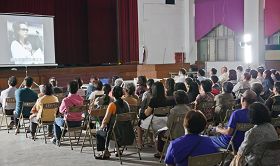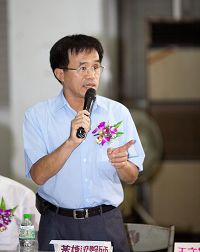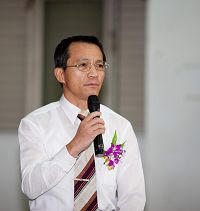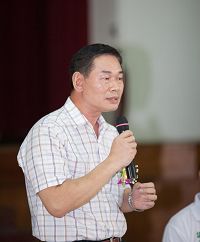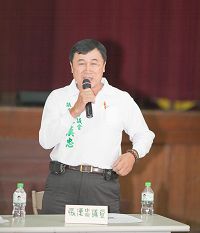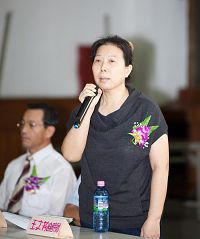Taiwan: Residents of Wujia, Kaohsiung Urge Chinese Communist Party to Put a Stop to Organ Harvesting from Living Falun Gong Practitioners (Photos)
(Clearwisdom.net) The brutality of the Chinese Communist Party (CCP) selling organs illegally removed from living Falun Gong practitioners in China was exposed in 2006. Since then, the international community has been paying attention to and condemning such actions. Still, many of the people in Taiwan do not know about it and go to the mainland in order to receive organ transplants. Falun Gong practitioners in Kaohsiung held a workshop “The inside story and danger of going to mainland China to receive organ transplants” to expose the CCP’s crimes.
On the evening on November 23, 2011, the residents in Wujia, Kaohsiung held the 9th workshop at the Wujia Activity Center. Those who attended the workshop include Kaohsiung City Councilor Chang Han-Chung, magistrate of Xinfuli Mr. Li, magistrate of Kuofuli Mr. Chen, magistrate of Kuokuangli Mr. Weng, magistrate of Kuolungli Mr. Huang, magistrate of Kuotaili Mr. Wu, former colonel chief of staff Chu Hung-Hsiao, division head of Taiwan High Prosecutor’s Office in Kaohsiung He Chia-En, medical doctor Huang Dong-Liang, and anesthetist Wang Wen-Fang.
|
|
Currently about 5000 people in Taiwan go to the mainland to receive organ transplants every year. Many of them have died within a couple of years after they returned to Taiwan. Some people kept having kidney transplants but could not get well. These people did not know that their actions result in the death of Falun Gong practitioners for having their organs harvested while they were still alive.
Falun Gong practitioners in Kaohsiung hold free workshops to help the general public become aware of the risks of going to the mainland for organ transplants and understand the persecution of Falun Gong in China. They play short films and have forums to exchange information in the workshops.
Guan Jianzhong, representative from Broad Press Company that provided information about organ transplants in China, said, “The U.S. is the country with the largest number of organ transplants. It has nationwide databases for organ donors and recipients and an efficient organ transplant and sharing network. There are about 80 million in the database who agree to donate their organs after they die. At the same time, there is a great number of organ donations from relatives. Even so, the average waiting time for organ transplants in the U.S. is still long- eight months for a heart, two years and two months for a liver, three years and a month for a kidney. Useful organs cannot be without blood supply for too long- 12 to 24 hours for kidney, 12 hours for liver and 4 to 6 hours for heart.”
“Hence, if an organ did not come from a relative, it could only come from a healthy donor who had just died. Besides, a patient can only use organs that match his blood type and tissue type, and the chance of getting them from non-relatives is 6.5 percent. As a result, the chance of receiving a suitable organ is very slim.
“In China, due to cultural reasons and lack of legal protections, the number of willing donors is as low as possible. As of September 2007, there were only 61 brain dead patients who donated their organs. Donations between relatives took up 1.1 percent of the total number of organ donations. The source of organs is so limited, yet the hospitals in China never had to worry about not getting organs. There is a big problem in their sources of organs.”
|
|
Doctor Huang Dong-Liang said that he used to introduce his patients to go to the mainland to receive organ transplants because he wanted his patients to recover as a doctor, “Now I feel that something is just not right. I used to wonder how come my patients could get matching organs in mainland China so fast, but it did not occur to me that there was an enormous pool of organs in stock. It is scary just to think about it. I exacerbated the persecution (of the Falun Gong practitioners). Now I do not recommend anyone to do so.”
|
|
Former colonel chief of staff Chu Hung-Hsiao could not believe why the CCP treats its people that way and removes their organs while they were still alive, “There are a lot of hidden goings-on in mainland China that the general public can never know of. I strongly urge everyone not to go to the mainland to get organ transplants.”
|
|
He Chia-En, division head of Taiwan High Prosecutor’s Office in Kaohsiung, did not know anything about the illegal organ transplants until after the workshop. “It’s hard to imagine that the problem is so severe. The laws in Taiwan regarding (organ transplants) still have room to improve. I heard a patient was very unwilling when he learned that he got an organ from a death row prisoner. Now the organs people got in the mainland are from living people, this is even worse and inhumane. I hope everyone who knows about this will go home and tell their family and friends so that we can step forward to stop the persecution together.”
|
|
Chang Hang-Chung, Kaohsiung City Councilor, was very sympathetic upon hearing human rights problems in mainland China. “I thank you for letting me know the facts. We should set aside our political stances and let everyone know about it and condemn the CCP for such brutality.” The councilor was very willing to push for the Public Channel to play the video of today’s workshop so the citizens of Kaohsiung could learn about the truth as well.
|
|
According to anesthetist Wang Wen-Fang, there are a lot of problems with organ transplants such as rejection, prescriptions for different cases of organ transplants, and even phantom limb pain. “A friend of mine died shortly after he returned from the mainland with an organ transplant. I hope everyone can give it more thought. Organs from unknown sources put patients in even greater danger besides moral issues.”
